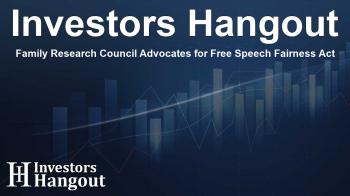Family Research Council Advocates for Free Speech Fairness Act

Family Research Council Backs New Legislation for Free Speech
In a significant move, the Family Research Council has expressed its strong support for the recently introduced Free Speech Fairness Act. This key piece of legislation, sponsored by U.S. Rep. Mark Harris and Senator James Lankford, aims to empower churches and nonprofit organizations, asserting their right to freely express political opinions while engaged in their regular activities. If passed, it will mark a notable shift in the regulatory landscape concerning political speech by these entities.
Objectives of the Free Speech Fairness Act
The Free Speech Fairness Act is designed to restore both free speech and religious liberty for various organizations, enabling them to make political statements as part of their customary operations. The proposal stipulates that any related expenses should be minimal, thus preventing undue financial burden on these institutions while preserving their freedom of expression.
Endorsements from Key Figures
On the introduction of this legislation, Tony Perkins, President of the Family Research Council, voiced strong support, emphasizing the long-standing effort to overturn the Johnson Amendment. This amendment has historically restricted religious leaders from engaging in political discourse, causing what Perkins describes as an infringement on pastoral rights.
Personal Stories Highlighting the Need
In addition to Perkins, Jody Hice, who previously sponsored this legislation and now serves as President of FRC Action, shared a compelling personal narrative. Hice recounted facing harassment from the IRS as a pastor, where his church's tax-exempt status was at risk over his sermons on politically relevant topics. He articulated a strong belief that the First Amendment protects all Americans, irrespective of their position or place of worship.
The Impact of Censorship on Faith Communities
The ongoing concerns regarding religious freedoms in the context of free speech highlight a critical discourse in contemporary society. The Family Research Council argues that freedom of speech is intrinsic to faith communities, where the ability to address societal issues from a biblical perspective is vital. The endorsement for the Free Speech Fairness Act represents not only a legislative initiative but a broader commitment to safeguarding the rights of religious organizations to speak on issues that matter to them.
Legislative Support and Future Endeavors
Expressing gratitude towards advocates for the bill, Perkins highlighted the collaborative efforts of various figures such as House Majority Leader Steve Scalise and former Congressman Jody Hice. The ongoing dialogue among bipartisan approaches demonstrates a concerted effort to navigate complex issues around speech rights and religious freedoms in a balanced manner moving forward.
Conclusion
The introduction of the Free Speech Fairness Act signifies a fresh dialogue in the legislative arena, highlighting the necessity for free expression within churches and nonprofit institutions. This initiative not only aims to alleviate the anxieties stemming from restrictive laws but also works towards ensuring that religious leaders are empowered to speak openly on matters they deem important. As discussions progress, the implications of this legislation could potentially reshape how political discourse and faith intersect in American society.
Frequently Asked Questions
What is the Free Speech Fairness Act?
The Free Speech Fairness Act aims to restore free speech and religious liberty for churches and nonprofits, allowing them to make political statements within their regular activities.
Who introduced the legislation?
The legislation was introduced by U.S. Rep. Mark Harris and Senator James Lankford.
What concerns does the Act address?
The Act addresses concerns regarding the Johnson Amendment, which has historically restricted political speech from religious leaders.
What is the position of the Family Research Council on this Act?
The Family Research Council fully endorses the Act, viewing it as a critical step toward protecting religious freedom and free expression within faith communities.
How could this legislation impact churches?
If enacted, this legislation could allow churches to freely engage in political discussions without fear of losing their tax-exempt status for minimal related expenditures.
About The Author
Contact Addison Perry privately here. Or send an email with ATTN: Addison Perry as the subject to contact@investorshangout.com.
About Investors Hangout
Investors Hangout is a leading online stock forum for financial discussion and learning, offering a wide range of free tools and resources. It draws in traders of all levels, who exchange market knowledge, investigate trading tactics, and keep an eye on industry developments in real time. Featuring financial articles, stock message boards, quotes, charts, company profiles, and live news updates. Through cooperative learning and a wealth of informational resources, it helps users from novices creating their first portfolios to experts honing their techniques. Join Investors Hangout today: https://investorshangout.com/
The content of this article is based on factual, publicly available information and does not represent legal, financial, or investment advice. Investors Hangout does not offer financial advice, and the author is not a licensed financial advisor. Consult a qualified advisor before making any financial or investment decisions based on this article. This article should not be considered advice to purchase, sell, or hold any securities or other investments. If any of the material provided here is inaccurate, please contact us for corrections.

